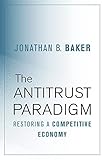The antitrust paradigm : restoring a competitive economy / Jonathan B. Baker.
Material type: TextPublisher: Cambridge, Massachusetts : Harvard University Press, 2019Description: 349 pages ; 25 cmContent type:
TextPublisher: Cambridge, Massachusetts : Harvard University Press, 2019Description: 349 pages ; 25 cmContent type: - text
- unmediated
- volume
- 9780674975781
- 338.8/20973 23
| Item type | Current library | Call number | Materials specified | Status | Date due | Barcode | |
|---|---|---|---|---|---|---|---|
 Reference
Reference
|
MYCC Library Reference | 338.820973 BAK 2011 REF (Browse shelf(Opens below)) | Not for loan | ||||
 Books
Books
|
MYCC Library General stacks | 338.820973 BAK 2011 (Browse shelf(Opens below)) | Available | ||||
 Books
Books
|
MYCC Library General stacks | 338.820973 BAK 2011 (Browse shelf(Opens below)) | Available | ||||
 Books
Books
|
MYCC Library General stacks | 338.820973 BAK 2011 (Browse shelf(Opens below)) | Available |
Browsing MYCC Library shelves, Shelving location: Reference Close shelf browser (Hides shelf browser)

|

|

|

|

|

|
No cover image available No cover image available | ||
| 338.82 MAR REF 2012 The economics of collusion : cartels and bidding rings / | 338.82 TIM 2020 REF The curse of bigness : antitrust in the new Gilded Age / | 338.82015195 DAV 2010 REF Quantitative techniques for competition and antitrust analysis / | 338.820973 BAK 2011 REF The antitrust paradigm : restoring a competitive economy / | 338.85 ANT 2019 REF The antitrust revolution / economics, competition, and policy / | 338.9 POR 1990 REF The competitive advantage of nations : with a new introduction | 338.927 REG 2024 REF Regulating fair competition toward sustainable development goals / |
Includes bibliographical references and index.
Part I. The market power paroxysm and the antitrust paradigm: Market power in an era of antitrust -- The faltering political consensus supporting antitrust -- Preventing the political misuse of antitrust -- Recalibrating error costs and presumptions -- Erroneous arguments against enforcement -- Part II. Antitrust rules and the information economy: Inferring agreement and algorithmic coordination -- Exclusionary conduct by dominant platforms -- Threats to innovation from lessened competition -- Harm to suppliers, workers, and platform users -- Part III. Looking forward: Restoring a competitive economy.
In the 1970s, when the United States economy was struggling and the term "stagflation" was coined to capture inflation plus stagnant business growth, the "Chicago school" critique of antitrust rules gained ascendance. In the 1980s, during Ronald Reagan's two terms as president, that critique's policy prescriptions-the eliminating of or modifying anticompetitive rules to make them less restrictive-became common practice. As Jonathan Baker writes, "The Chicago approach to antitrust can be understood as a gamble. More relaxed antitrust rules would allow firms to achieve greater efficiencies, which would more than compensate for any risk of firms exercising market power. Put differently, the Chicagoans bet that antitrust reform could achieve long term consumer welfare gains without facilitating the creation of substantial and durable market power." The Antitrust Paradigm presents a wealth of evidence arguing that the Chicagoans lost their bet, and prescribes what should be done about it. Since the 1980s, not only has market power widened, economic productivity decline, and consumer welfare gains been modest at best, but also the economy has changed, most visibly in the information technology and Internet giants that top the financial market's valuation charts. Baker argues that both the failures of antitrust reform and the changed economy demand a new antitrust paradigm, one that restores a competitive economy through strengthened antitrust, recognizes antitrust's political context, and identifies the competitive harms from dominant information technology platforms. His book frames the problem, examines the distinctive competitive problems of the information economy, and concludes with a guide for restoring effective antitrust policies.-- Provided by publisher
There are no comments on this title.
